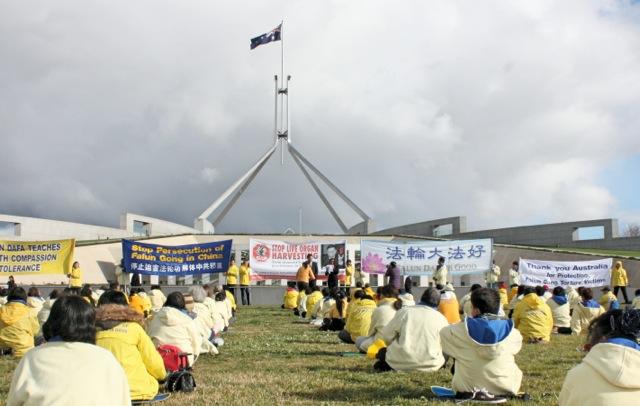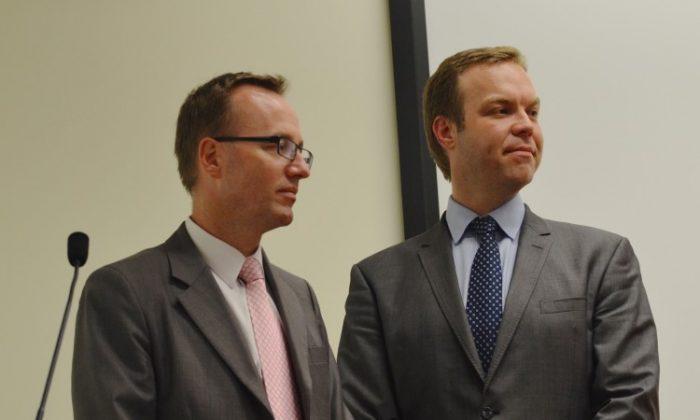[ Video Courtesy of NTDTV ]
SYDNEY—The passing of the biggest reform deal since the 1997 British handover of Hong Kong has cost the embattled Democratic Party thousands of votes from the younger radical groups, say analysts.Hong Kong’s political climate has hit boiling point after the Chief Executive Donald Tsang has won majority votes in the Legislature for a reform package, which aims to amend the voting process for the 2012 elections.
The package was passed on June 25 after a marathon three-day debate between the lawmakers. The deal has caused a major political rift after the Democratic Party—the oldest and largest of the pan-democratic forces—has agreed to drop key amendments to the reform.
The radical voices have accused the Democratic Party of colluding with Beijing and making unforgiveable compromises, which has allowed Tsang to gain majority of votes for the reform deal.
Dr James Sung Lap-kung, a political analyst at City University in Hong Kong, told Asia Times Online that the Democratic Party was widening the split in the pan-democratic camp and was losing radical and young voters.
“The Democratic Party is set to lose young and radical supporters to the LSD or the Civic Party in the district council elections next year and even the 2012 Legislative Council elections,” Sung said in the Asia Times report.
People under the age of 24 make up more than a quarter of Hong Kong’s population, according to the 2006 census data. They have been seen as being instrumental in recent large actions against Government schemes, like the 2003 protest against Article 23 – a bill that was set to clamp down freedom of expression—or the annual Tiananmen Square commemorations.
In May this year the youth groups supported en masse the de facto referendum on democratic elections.
“Young and radical voters played an important role in the ‘May 16 referendum’,” Sung said, referring to the radical by-election that five lawmakers—three from the LSD and two from the Civic Party—forced in January to stage what they regarded as a de facto referendum on the city’s democratisation. Beijing denounced the by-election as unconstitutional.
The post-1980s generation was also active in January’s campaign against the controversial HK$66.9 billion (US$8.3 billion) funding for a high-speed rail link to Guangzhou across the border.
The same youth crowds gathered outside the Legislature last week, urging the Government not to pass the controversial reform deal.
The reforms will add an extra 10 seats to the Legislature, which will bring the total number of seats to 70. However, only 40 of these will be directly elected. The remainder will be chosen by special interest groups, called functional constituencies, traditionally dominated by pro-Beijing forces.
Critics say the package was nothing more than a mockery of reform. It fell short of any commitment to abolish the unelected tycoons (functional constituencies). It also failed to move any closer towards universal suffrage, that is, to give ordinary voters the power to install or to eject all legislators and the chief executive.
Falling Into a Trap
Meanwhile, attacks have struck the Democratic Party’s decision to drop their initial amendments to Tsang’s package.
Prior to the crucial vote last week Albert Ho, the leader the Democratic Party, had proposed three key amendments to the reform deal.
These included removing functional constituency seats, setting a date for universal suffrage and opening the five new council seats to a popular vote.
However, just days before the vote Ho agreed to drop the first two crucial elements without notifying his party. The move came as a shock to the pan democrats, who argue Ho has compromised their fight for true democracy in Hong Kong.
“This is the darkest day in Hong Kong’s democratic development,” yelled radical pro-democracy lawmaker Albert Chan, before storming out of the legislature. Chan was one of 12 pro-democracy lawmakers voting against the package, reports Reuters.
Inside the Democratic Party there is obvious disagreement as veteran Democrats have left or are considering leaving the party. Martin Lee Chu-ming, founding chairman of the party, said he would consider quitting as the party was departing from its pledge to fight for universal suffrage.
HK Senior journalist Ching Cheong thinks that now it’s the lowest point in the Hong Kong’s political development ever since it’s handover to the Chinese regime in 1997.
Ching says that the Chinese Communist Party’s increased interferences of the reform package, repeated efforts to twist the definition of universal suffrage, and the unified tone of the SAR government are indications that “the CCP has taken away the rights of political development of Hong Kong people”.
Senior media professional and China Affairs commentator Li Zi says that Beijing has manipulated the Democratic Party.
“The CCP has a very in depth analysis of the situation, who to bribe, who to alienate, and it’s obvious that they have [a] good analysis of Albert Ho and he is a candidate to work on to get him eventually to succumb to CCP”.
Meanwhile, Ching cautioned that Hong Kong should protect the “one country two systems” agreement, which was set up to guarantee autonomy of a free society at the 1997 hand over to Beijing rule. “I think every Hong Kong person should look at the facts, and ask ourselves: What do we want for Hong Kong? How do we preserve Hong Kong’s superiority, so Hong Kong can continue to play its role of pushing China towards modern civilization?“ Ching said.
“If you feel that we should continue to play this role, we should make use of Hong Kong’s freedom of thought and freedom of speech—this is the kind of superiority that will continue to push the development in China. The present situation of low autonomy over Hong Kong political development should alert us and cause us worry.”



Friends Read Free